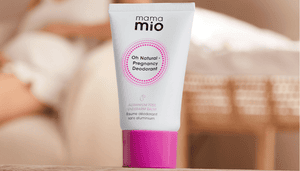
We’ve asked Midwife Vic, our Mama Mio resident Midwife with a decade of experience, to shed light on navigating the postpartum period. By breaking the days and weeks to follow down, we hope our Mamas and Mamas-to-be can really understand how to prepare and thrive during this transformative time.
The First Days Following Your Birth:
In the initial 24 hours, the postpartum experience might seem like a blur. The type of birth you have had will determine how quickly you get back on your feet. I recommend accepting as much help as possible from midwives during this time of rest and recovery.
- Bleeding: You should expect bleeding. No matter what type of birth you have, you will experience bleeding from your vagina and it will be heaviest in the first 24 hours. Top Tip – double up any maternity pads by placing one at the front, and overlapping it with a second maternity pad that sits further back in your underwear. Large, soft and stretchy underwear are the ones to go for.
- Managing Pain: You may experience some pain from any stitches in your perineum or vulva or from your c-section scar if you have birthed this way. Make sure to take pain relief regularly which should be supplied by your midwives.
- Lactation: Your ‘milk coming in’ is a term used to describe the colostrum changing to breast milk. This often happens around day three and you’ll experience sore, full and engorged breasts. Continue to feed as normal. As your milk comes in, your body will experience the single biggest drop in hormone levels that it will ever experience. Women can often feel incredibly emotional, low mood, low self esteem and generally very vulnerable. This is normal but just because it’s normal, doesn’t mean it’s not incredibly difficult. Stay home, lean on the support around you whether that’s your partner, your family or your midwives and know that it will pass.
- Breastfeeding Challenges: If you are breastfeeding your baby, you will find that your boobs are out a lot while you get to grips with this new skill. It can be hard at first. Positioning and latch can be tricky to get the hang of, so make sure to get your midwives to support you with all of your feeds at first. Double and triple check that latch to make sure your little one is well fed, and that your nipples aren’t at risk of any damage. Lots of women do experience some nipple soreness and sometimes experience some damage or lacerations to the nipple itself. Nipple cream is an essential to pack into your bag. Use it liberally and often!
The Weeks Following Your Birth:
As days turn into weeks, healing progresses, and you’ll begin to find comfort in movement. However, remember that recovery is an ongoing process that cannot be rushed.
- Stitch: As the days move to weeks, any stitches that you have had will be starting to dissolve or will have been removed. You will be moving with more ease, and you probably won’t be experiencing as much discomfort as you did initially.
- Feeding Patterns: You may have found that you’re slowly getting into more of a rhythm with feeding. Don’t expect any routine at this stage. Your baby will continue to have cluster feed episodes. Growth episodes will cause your little one to have nights where they feed and feed and feed. If you are still having difficulty with your baby’s latch it’s worth looking into additional feeding support such as a lactation consultant or breastfeeding peer supporter
- Sleep Challenges: Sleep will be sporadic. The deprivation can be chronic and it can make the simplest of tasks difficult and overwhelming. Lack of sleep can feed into postnatal depression and anxiety as well. Accept the help when it’s offered and even if you are finding sleep difficult, let your partner, family, or friend watch your baby while you simply rest in bed.
- Physical and Emotional Recovery: As you start to move around more, and feel a little stronger, you might find that you put pressure on yourself to do more and more. Remind yourself that you are still recovering from a huge physical challenge and your body is still continuing to heal and change. Be kind to yourself and appreciate what your amazing body has done.
Remember: The postpartum period is a unique journey. Your body deserves the care and respect necessary for a strong recovery as you embrace your new role. Give the gift of time to your body and remove any pressure that society or social media dole out. Your strong, resilient and capable body that has birthed your baby into this world, deserves the nurture, kindness and respect that it needs as you slowly recover and stride out as a new version of yourself. For professional guidance and support, trust Midwife Vic’s expertise and give yourself the gift of a nurturing postpartum experience.








